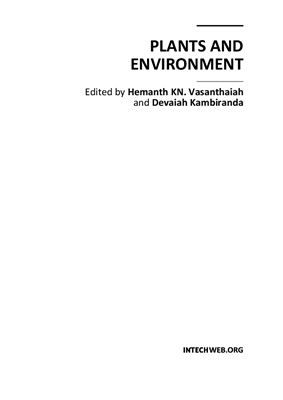InTech. 2011. 284 p.
Changing environmental condition and global population demands understanding the plant responses to hostile environment. Significant progress has been made over the past few decades through amalgamation of molecular breeding with non-conventional breeding. Understanding the cellular and molecular mechanisms to stress tolerance has received considerable scientific scrutiny because of the uniqueness of such processes to plant biology, and also its importance in the campaign Freedom From Hunger. The main intention of this publication is to provide a state-of-the-art and up-to-date knowledge of recent developments in understanding of plant responses to major abiotic stresses, limitations and the current status of crop improvement. A better insight will help in taking a multidisciplinary approach to address the issues affecting plant development and performance under adverse conditions. I trust this book will act as a platform to excel in the field of stress biology.
Contents
Enhancing Phytoremediation Efficiency in Response to Environmental Pollution Stress
Morphophysiological Investigations in Some Dominant Alien Invasive Weeds
Alteration of Abiotic Stress Responsive Genes in Polygonum minus Roots by Jasmonic Acid Elicitation
Transcriptomics of Sugarcane Osmoprotectants Under Drought Effect of UV Light on Secondary Metabolite Biosynthesis in Plant Cell Cultures Elicited with Cyclodextrins and Methyl Jasmonate
Drought Tolerance and Stress Hormones: From Model Organisms to Forage Crops
Iron Stress in Citrus
Response, Tolerance and Adaptation to Abiotic Stress of Olive, Grapevine and Chestnut in the Mediterranean Region: Role of Abscisic Acid, Nitric Oxide and MicroRNAs
Molecular and Genetic Analysis of Abiotic Stress Resistance of Forage Crops
Salt Stress in Vascular Plants and Its Interaction with Boron Toxicity
An Efficient Method to Screen for Salt Tolerance Genes in Salt Cress
Impact of Drought Stress on Peanut (Arachis hypogaea L.) Productivity and Food Safety
Changing environmental condition and global population demands understanding the plant responses to hostile environment. Significant progress has been made over the past few decades through amalgamation of molecular breeding with non-conventional breeding. Understanding the cellular and molecular mechanisms to stress tolerance has received considerable scientific scrutiny because of the uniqueness of such processes to plant biology, and also its importance in the campaign Freedom From Hunger. The main intention of this publication is to provide a state-of-the-art and up-to-date knowledge of recent developments in understanding of plant responses to major abiotic stresses, limitations and the current status of crop improvement. A better insight will help in taking a multidisciplinary approach to address the issues affecting plant development and performance under adverse conditions. I trust this book will act as a platform to excel in the field of stress biology.
Contents
Enhancing Phytoremediation Efficiency in Response to Environmental Pollution Stress
Morphophysiological Investigations in Some Dominant Alien Invasive Weeds
Alteration of Abiotic Stress Responsive Genes in Polygonum minus Roots by Jasmonic Acid Elicitation
Transcriptomics of Sugarcane Osmoprotectants Under Drought Effect of UV Light on Secondary Metabolite Biosynthesis in Plant Cell Cultures Elicited with Cyclodextrins and Methyl Jasmonate
Drought Tolerance and Stress Hormones: From Model Organisms to Forage Crops
Iron Stress in Citrus
Response, Tolerance and Adaptation to Abiotic Stress of Olive, Grapevine and Chestnut in the Mediterranean Region: Role of Abscisic Acid, Nitric Oxide and MicroRNAs
Molecular and Genetic Analysis of Abiotic Stress Resistance of Forage Crops
Salt Stress in Vascular Plants and Its Interaction with Boron Toxicity
An Efficient Method to Screen for Salt Tolerance Genes in Salt Cress
Impact of Drought Stress on Peanut (Arachis hypogaea L.) Productivity and Food Safety

